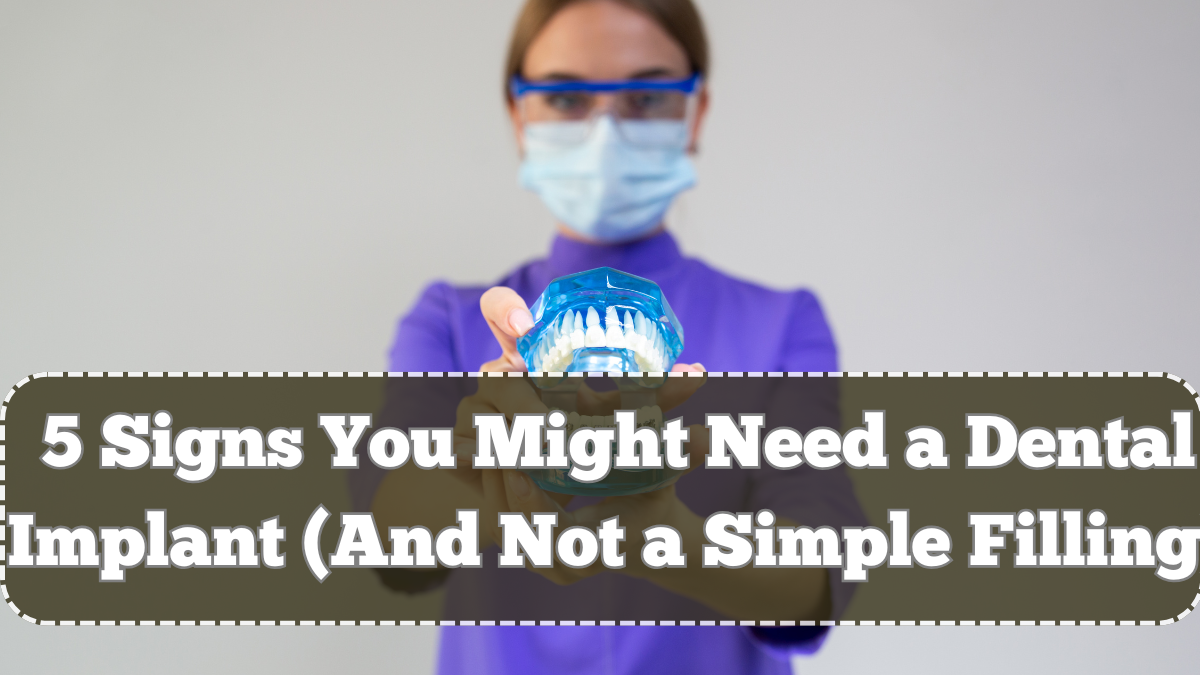Toothaches and sensitivity can often be treated with fillings or crowns—but in some cases, the damage is too far gone for a quick fix. That’s when a dental implant becomes the most reliable option. If you’re experiencing recurring issues, you may already be a candidate for this form of tooth replacement.
A dental implant is a permanent solution that replaces the root and crown of a missing or failing tooth. Unlike temporary fixes, it restores full functionality and protects your long-term dental health. So how do you know if a filling or root canal won’t be enough?
Below are the top 5 warning signs that it might be time to consider oral surgery for a dental implant.

5 Signs You Might Need a Dental Implant
Have a look:
1. You Have a Severely Damaged or Cracked Tooth
If your tooth is broken below the gum line or has multiple fractures, it might not be salvageable with a crown or filling. Severe damage usually affects the root, making it unstable.
In these cases, a dental implant can replace the entire tooth structure, offering a long-lasting solution and restoring your smile.
2. You’ve Lost a Tooth or Have a Gap That’s Widening
Missing teeth can lead to bone loss and shifting of nearby teeth. Even a single gap affects your bite, chewing, and speech. A growing space in your teeth may indicate the bone underneath is deteriorating.
This is a clear sign you may need a tooth replacement using an implant to prevent further complications and protect your overall dental health.
3. You’re Constantly Getting Infections Around the Same Tooth
Repeated infections or abscesses around a tooth indicate deep-root issues that a filling or root canal may not solve. These infections can also impact your gums and surrounding bone tissue.
For long-term relief and to avoid frequent dental visits, a dental implant may be recommended by your dentist after evaluating your oral surgery needs.
4. Your Dentures or Bridges Are Loose or Uncomfortable
If you wear dentures or bridges that slip or irritate your gums, it may be time to switch to a more permanent and stable solution. Dentures can also lead to jawbone loss over time.
Dental implants offer a fixed, natural-feeling alternative that eliminates discomfort and helps maintain jawbone density, promoting better dental health.
5. You’ve Been Told You Don’t Have Enough Tooth Left for Restoration
Sometimes after tooth decay, only a small portion of the tooth remains. In such cases, there’s not enough surface for a crown or filling to be stable. This can lead to quick failure of the restoration.
An implant provides a full tooth replacement from root to crown, ensuring strength and stability for many years.
FAQs
How do I know if I need a dental implant instead of a filling?
If your tooth is cracked, repeatedly infected, or mostly gone, you may need a dental implant instead of a filling. Your dentist can confirm after a full exam.
Can I get an implant if I already have a missing tooth?
Yes. A dental implant is the best long-term solution for tooth replacement and prevents bone loss where the tooth is missing.
Do dental implants hurt more than other dental treatments?
Implant surgery involves minor oral surgery, but it’s done under anesthesia and most patients report only mild discomfort during recovery.
Are there risks if I delay replacing a missing tooth?
Yes. Waiting too long can cause jawbone deterioration and shifting teeth. A dental implant helps preserve both function and aesthetics.
Will my dental insurance cover the cost of implants?
It depends on your provider, but many UK and international plans now offer partial cover for medically necessary tooth replacement via implants.
Click here to know more.
